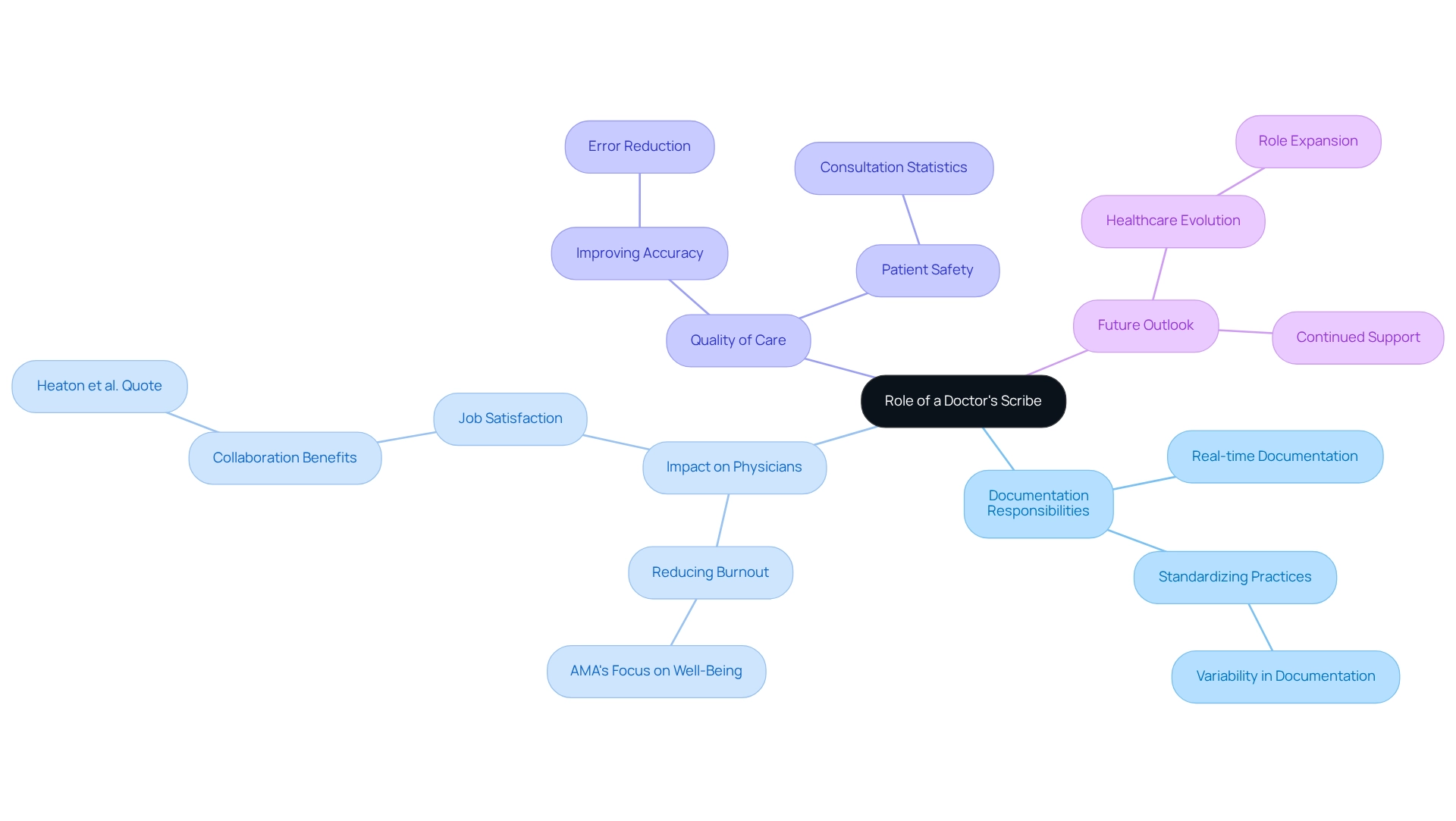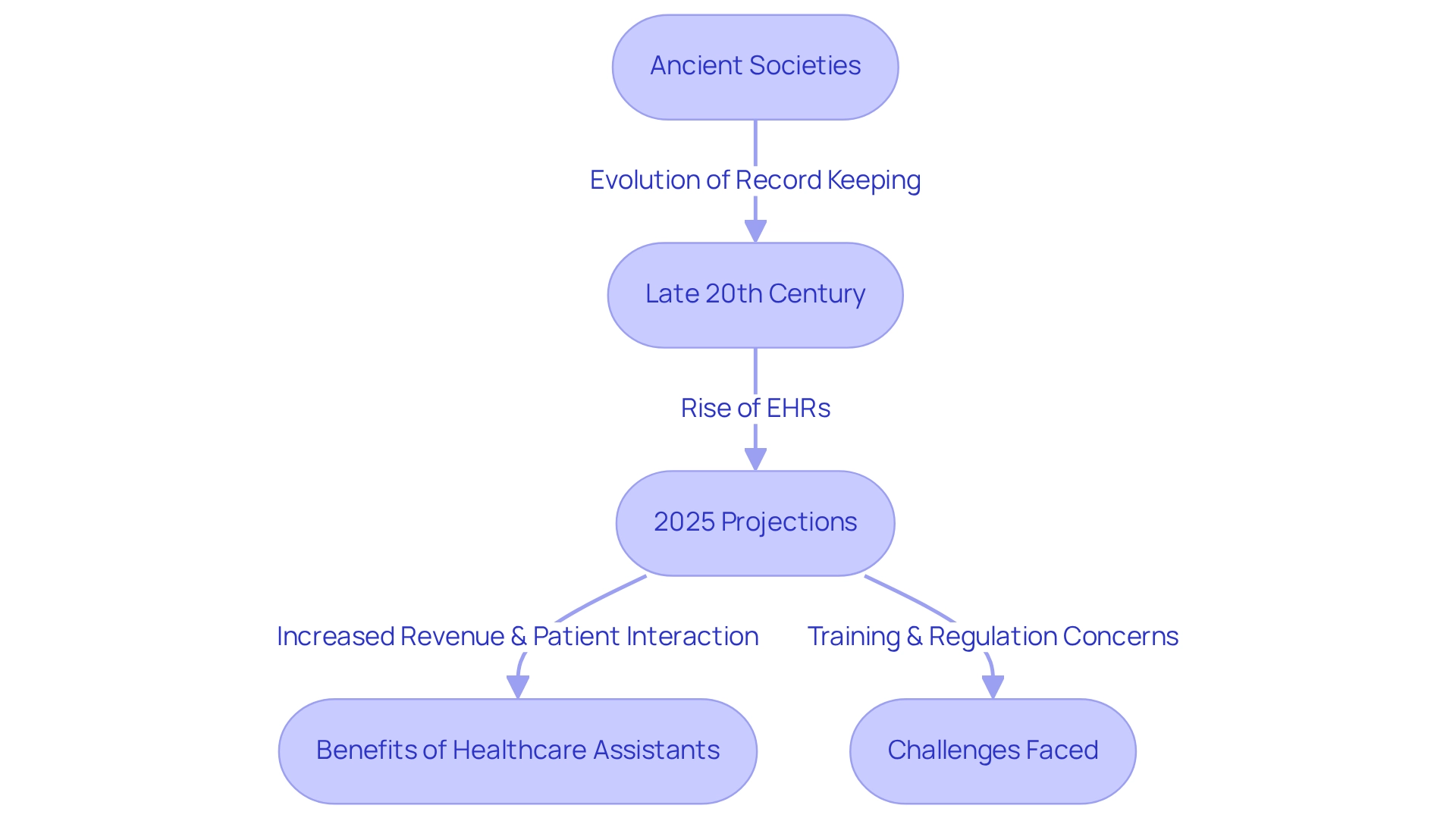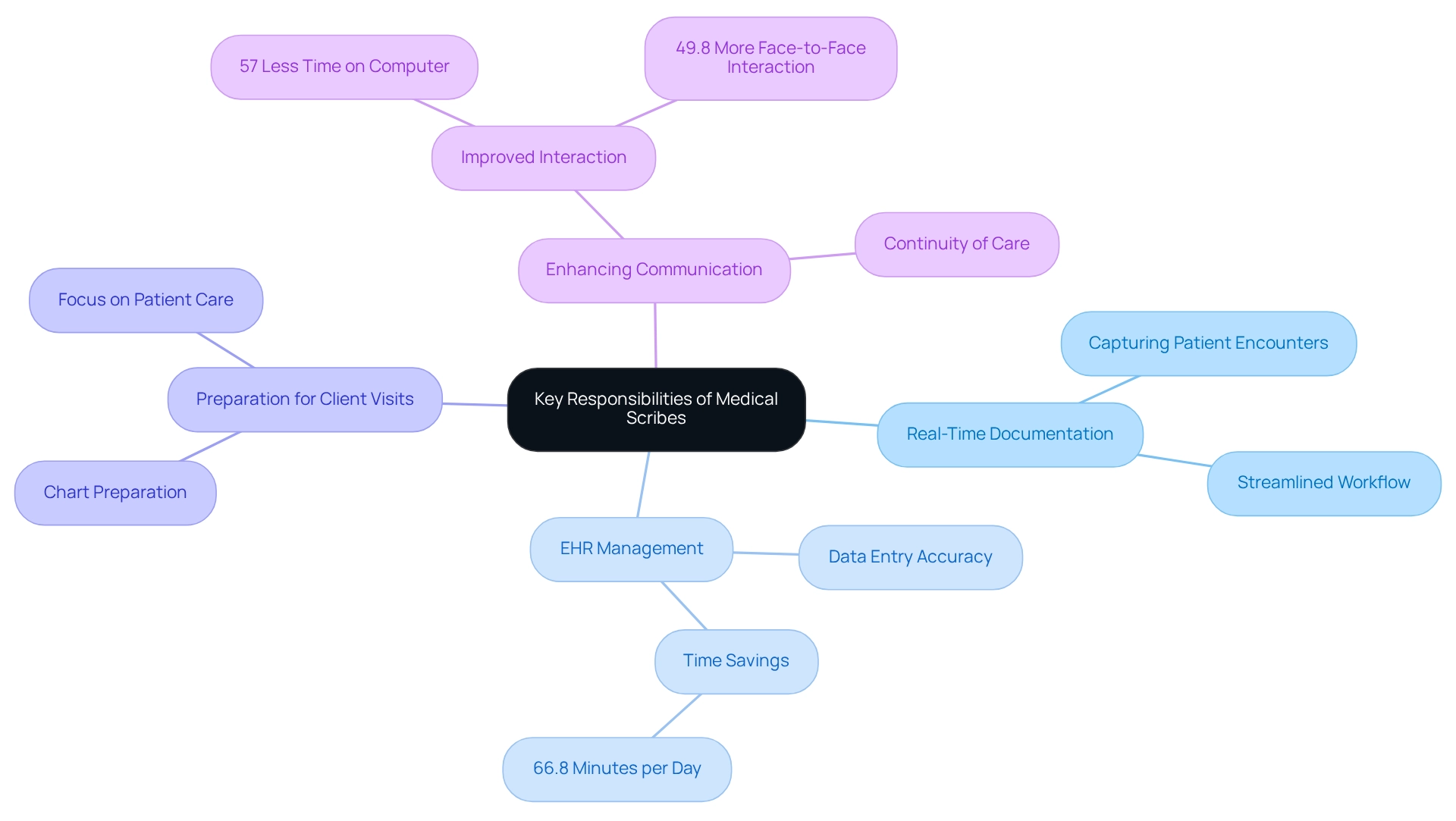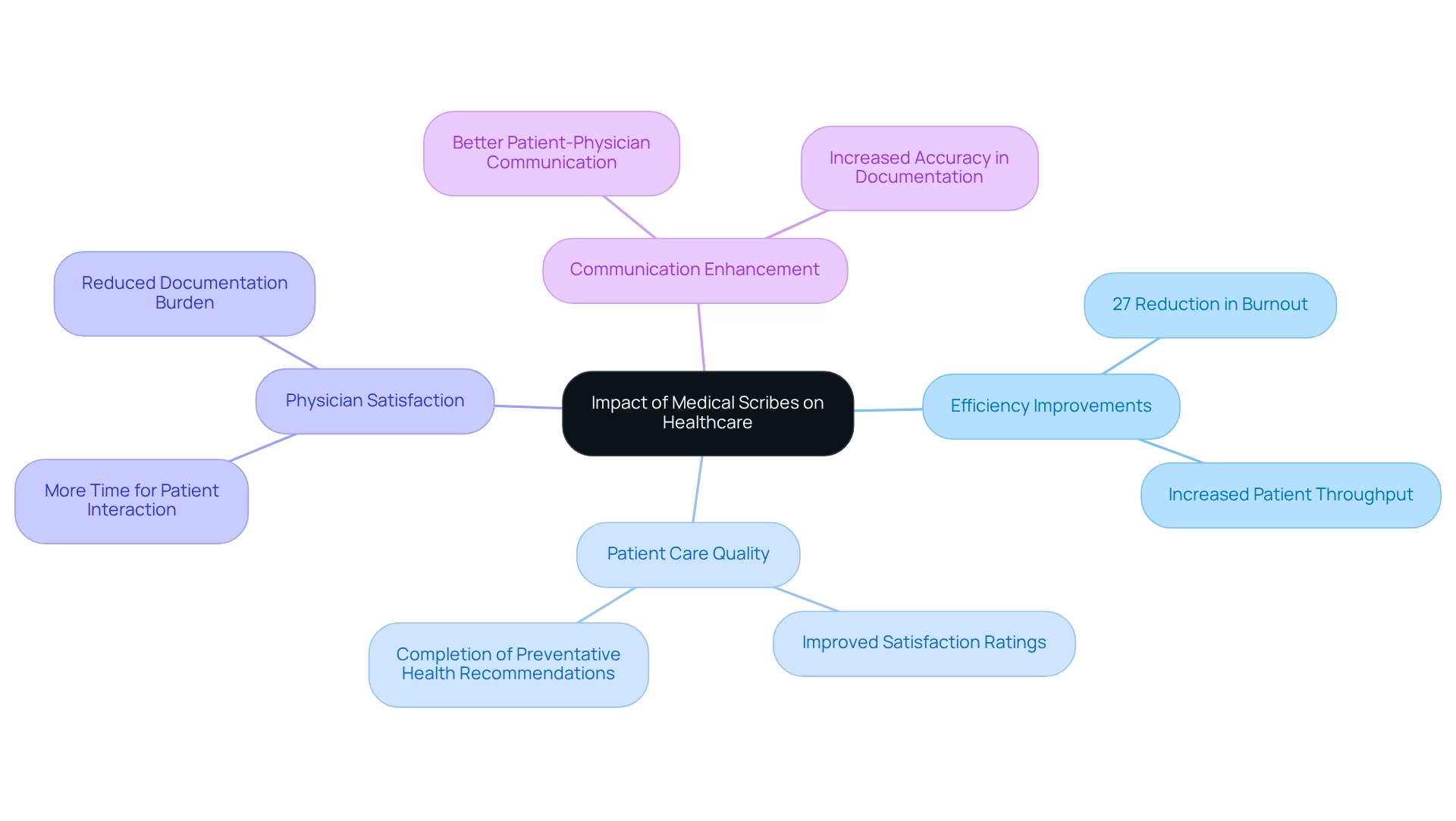Overview
In the demanding world of healthcare, providers often face overwhelming emotional challenges. The burden of administrative tasks can detract from their ability to deliver compassionate patient care. This is where the role of a doctor's scribe becomes invaluable. By documenting patient encounters in real-time, scribes allow healthcare providers to focus more on what truly matters—their patients.
Imagine a scenario where physicians can devote their full attention to patients, free from the stress of paperwork. Scribes enhance documentation accuracy, reduce physician burnout, and foster better communication between providers and patients. These improvements not only elevate the quality of healthcare delivery but also create a more supportive environment for both patients and providers.
Could implementing a scribe system be the solution to these common challenges? By increasing overall efficiency in healthcare practices, scribes play a crucial role in transforming the patient experience. It’s time to consider how this support can lead to a healthier, more compassionate healthcare system. Let’s take a step towards enhancing patient care together.
Introduction
In the ever-evolving landscape of healthcare, medical scribes play a crucial role in enhancing both efficiency and patient care. Have you ever felt overwhelmed by the administrative tasks that can distract from what truly matters? These specialized professionals not only document patient encounters in real-time but also lift the heavy administrative burdens often placed on physicians. By streamlining documentation processes and improving communication within healthcare teams, scribes allow providers to focus more on delivering high-quality care to their patients.
As the demand for medical scribes continues to grow, so does their positive impact on the healthcare system. Imagine a future where patient interactions take precedence over paperwork and administrative tasks. This article delves into the multifaceted role of medical scribes, exploring their historical context, key responsibilities, and the significant benefits they bring to healthcare efficiency and patient satisfaction. Together, let’s explore how embracing this role can lead to a more compassionate and effective healthcare experience.
Defining the Role of a Doctor's Scribe
Healthcare providers often face overwhelming emotional challenges, navigating a demanding environment where their focus should be on patient care. A clinical recorder plays a vital role in healthcare by documenting individual interactions in real-time, which leads to the question of what is a doctor's scribe. This role captures essential details, such as medical histories, examination findings, and treatment plans directly into electronic health records (EHR). By managing these documentation tasks, clerks significantly lighten the administrative load on doctors, which raises the question of what is a doctor's scribe, allowing physicians to dedicate more time to their patients and enhance the overall effectiveness of healthcare delivery.
This streamlining is crucial. It empowers physicians to concentrate on providing high-quality care rather than being bogged down by time-consuming administrative tasks like appointment scheduling and billing. The presence of record-keepers standardizes documentation practices, as evidenced by in documentation among physicians in their absence. Such inconsistency can adversely affect the quality of medical records. However, with the support of assistants, including what is a doctor's scribe, documentation becomes more reliable, ultimately improving the quality of healthcare information.
Recent data reveals that record keepers are involved in approximately 1 in 300 consultations, with errors in identifying individuals being the most frequent issue, occurring in 7 out of 16 instances. This underscores the importance of precise documentation in ensuring safety and quality of care. Moreover, the American Medical Association (AMA) acknowledges that understanding what is a doctor's scribe is essential, as the burden of electronic health record systems significantly contributes to physician burnout. Their initiatives aim to prioritize physician well-being, highlighting the necessity for support positions to alleviate administrative tasks and enhance patient care.
Expert opinions consistently affirm the benefits of collaborating with writers. Heaton et al. noted that "assistants are well accepted by individuals, and most doctors find collaborating with assistants advantageous." Many medical experts discover that assistants not only enhance documentation accuracy but also increase overall job satisfaction by allowing them to focus on client interactions rather than administrative tasks. As we approach 2025, the role of healthcare assistants is expected to evolve further, continuing to support doctors in delivering high-quality care while easing the burdens of administrative responsibilities.
Furthermore, findings from a multicenter randomized study published in BMJ 2019 indicate that medical assistants positively influence emergency medicine physicians' productivity and patient flow. This reinforces their significance in the healthcare landscape.
How can we further support our healthcare providers? By recognizing the value of these roles and advocating for their integration, we can foster a more compassionate and efficient healthcare environment.

Historical Context and Evolution of Medical Scribes
The function of healthcare recorders has profound historical origins, reaching back to ancient societies where they played a vital role in documenting health-related knowledge and practices. In ancient Egypt, Greece, and Mesopotamia, skilled writers meticulously recorded health-related texts and treatments, ensuring the preservation and sharing of . As we reflect on this legacy, it becomes clear how the contemporary idea of healthcare record keepers began to take shape in the late 20th century, particularly with the rise of electronic health records (EHRs). With health legislation increasingly mandating EHR usage, the demand for clinical assistants surged, leading to their widespread adoption across treatment environments.
By 2025, we anticipate a significant expansion in the use of healthcare assistants, with projections indicating a rise from 15,000 to over 100,000 assistants in the United States. This growth underscores their essential role in healthcare teams, where they streamline documentation processes and enhance care efficiency. Importantly, practices utilizing healthcare assistants report increased revenue, more face time with patients, and heightened physician satisfaction. A compelling case study titled 'Impact of Health Record Assistants on Physician Practices' reveals that physician practices leveraging health record assistants experience these benefits. However, challenges persist, including concerns regarding the lack of training and regulation for assistants, as well as task limitations that may impede advancements in EHR systems.
The historical significance of medical record keepers is further highlighted by their evolution alongside technological progress in medicine. As medical professionals increasingly rely on EHRs, the role of assistants has transformed, allowing clinicians to focus more on meaningful interactions with patients rather than administrative duties. At CosmaNeura, we recognize that empowering medical practitioners through innovative AI solutions is crucial for enhancing care quality and expanding physician capacity. Burke, a healthcare recorder, shared, "I feel as though I can focus solely on the individuals, and not solely on the documentation aspect of it." This shift not only boosts job satisfaction among medical professionals but also elevates the overall quality of care for patients.
Moreover, with 77% of medical recorders holding a bachelor's degree and an average salary of $30,045, this profession reflects a well-educated workforce dedicated to improving medical services. It is essential to acknowledge the common challenges faced in the healthcare field and to support one another in navigating these complexities. Together, we can foster an environment that prioritizes both the well-being of healthcare providers and the patients they serve.

Key Responsibilities and Functions of Medical Scribes
Medical scribes play a vital role in enhancing the efficiency of healthcare operations through a variety of key responsibilities:
- Real-Time Documentation: Scribes meticulously document patient encounters during visits, capturing essential details such as symptoms, diagnoses, and treatment plans. This real-time documentation not only ensures accuracy but also allows for a more streamlined workflow, which is crucial in a healthcare landscape increasingly supported by AI-driven solutions.
- EHR Management: They are responsible for entering data into electronic health records (EHR), ensuring that is recorded accurately and is readily accessible. This task is crucial, as studies indicate that completing EHR inbox notifications can consume approximately 66.8 minutes per day, underscoring the need for efficient management. By easing this burden, scribes allow providers to concentrate more on care for individuals, which helps illustrate what is and its role in enhancing provider efficiency through innovative technologies.
- Preparation for Client Visits: Scribes prepare charts and gather necessary information prior to client appointments. This preparation allows physicians to focus on providing care instead of being overwhelmed by paperwork, ultimately improving the experience for those receiving treatment. With the integration of AI tools, such as telemedicine and AI-powered diagnosis systems, this process can be further optimized, allowing for even more effective interactions with individuals seeking care.
- Enhancing Communication: By managing documentation, record keepers enhance interaction between medical providers and individuals. This ensures that all parties are well-informed and engaged in the care process, fostering a collaborative environment that is essential for patient-centric care. Furthermore, by optimizing communication, record keepers assist in reducing the fragmentation of healthcare systems, ensuring continuity of care.
The influence of what is a doctors scribe extends beyond operational efficiency; they significantly enhance client satisfaction. A research involving 735 individuals revealed that 57% reported their primary care provider spent less time on the computer during visits with assistants, while nearly 50% noted increased face-to-face interaction. Moreover, expert insights indicate that employing note-takers can offer physicians an extra 15-20 minutes of direct patient interaction, which is essential in primary care environments. As Steven Lin, MD, noted, "We found that not only were physicians satisfied with the quality and accuracy of charting done by assistants, they were more satisfied with assisted charts than with their own."
Considering these obligations and advantages, the introduction of clinical assistants appears as a strategic method to reduce the pressures of EHR documentation, thus tackling physician burnout and enhancing overall job satisfaction among providers. The incorporation of AI technologies can further improve the efficiency of record keepers, as noted in the case study titled 'Addressing Physician Burnout with Record Keepers,' which stresses how their use can effectively alleviate EHR-related stress, further highlighting the significance of incorporating record keepers into medical environments.

Impact of Medical Scribes on Healthcare Efficiency and Patient Care
The incorporation of medical assistants into healthcare practices has been shown to significantly improve both efficiency and the quality of care. Have you ever thought about what is a doctor's scribe and how much time doctors spend on documentation? Studies indicate that when doctors work alongside assistants, they experience a notable decrease in these burdens, allowing them to see more patients and dedicate more time to meaningful interactions. For instance, research reveals that employing note-takers can lead to a 27% reduction in physician burnout, alleviating the stress tied to extensive documentation demands.
Moreover, satisfaction ratings typically improve with the involvement of assistants. They foster better communication and enable doctors to focus on their patients rather than clerical duties. This is particularly crucial, as only 28.8% of depression assessments were completed during unrecorded visits, underscoring the vital role of assistants in ensuring comprehensive care for individuals. As ScribeAmerica highlights, "From to care team efficiency, medical assistants help teams reach their objectives and enhance financial results."
By collaborating with reliable health documentation agencies, practices can enhance record accuracy and compliance with healthcare regulations. This ultimately leads to improved quality outcomes and operational effectiveness. A compelling case study titled 'Streamlining Healthcare Efficiency' illustrates this point by showcasing what is a doctor's scribe and how its use has been recognized as a transformative step towards enhancing efficiency and patient-centered care. Wouldn't it be wonderful to see these benefits in your practice? Let's explore how medical assistants can make a difference together.

Conclusion
The role of medical scribes is increasingly vital in the healthcare landscape, as their contributions significantly improve both operational efficiency and patient care. By documenting patient encounters in real-time, managing electronic health records, and facilitating communication among healthcare teams, scribes alleviate the administrative burdens that often distract physicians from their primary focus—delivering high-quality care. Have you ever considered how these burdens impact your ability to connect with patients? As highlighted throughout the article, the presence of scribes not only standardizes documentation practices but also enhances the overall accuracy of patient records, which is paramount for maintaining patient safety.
Historically rooted in ancient practices, the evolution of medical scribes has been closely linked to advancements in healthcare technology, particularly the rise of electronic health records. The projected growth of the scribe profession underscores their importance within healthcare teams, where they contribute to increased patient interaction time and higher physician satisfaction. Imagine a scenario where you can focus entirely on your patients, knowing that their records are in capable hands. Furthermore, studies indicate that the integration of scribes leads to improved patient satisfaction scores, as patients experience more engaged interactions with their providers.
In conclusion, the adoption of medical scribes represents a strategic approach to addressing the challenges of modern healthcare. By reducing physician burnout and enhancing the quality of patient care, medical scribes play an instrumental role in creating a more efficient and compassionate healthcare system. As the demand for their services continues to grow, embracing the role of medical scribes will be essential for healthcare providers aiming to prioritize patient interactions over administrative tasks. This shift not only leads to better health outcomes but also fosters a more rewarding experience for both patients and physicians. Are you ready to explore how incorporating scribes can transform your practice?




